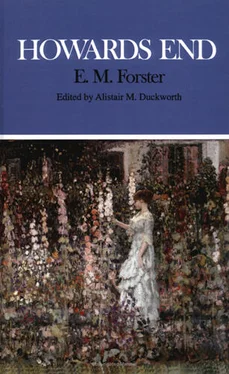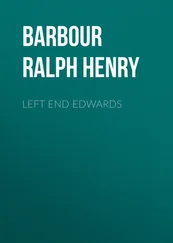Edward Morgan Forster - Howards End
Здесь есть возможность читать онлайн «Edward Morgan Forster - Howards End» весь текст электронной книги совершенно бесплатно (целиком полную версию без сокращений). В некоторых случаях можно слушать аудио, скачать через торрент в формате fb2 и присутствует краткое содержание. Жанр: Классическая проза, на английском языке. Описание произведения, (предисловие) а так же отзывы посетителей доступны на портале библиотеки ЛибКат.
- Название:Howards End
- Автор:
- Жанр:
- Год:неизвестен
- ISBN:нет данных
- Рейтинг книги:3 / 5. Голосов: 1
-
Избранное:Добавить в избранное
- Отзывы:
-
Ваша оценка:
- 60
- 1
- 2
- 3
- 4
- 5
Howards End: краткое содержание, описание и аннотация
Предлагаем к чтению аннотацию, описание, краткое содержание или предисловие (зависит от того, что написал сам автор книги «Howards End»). Если вы не нашли необходимую информацию о книге — напишите в комментариях, мы постараемся отыскать её.
Howards End — читать онлайн бесплатно полную книгу (весь текст) целиком
Ниже представлен текст книги, разбитый по страницам. Система сохранения места последней прочитанной страницы, позволяет с удобством читать онлайн бесплатно книгу «Howards End», без необходимости каждый раз заново искать на чём Вы остановились. Поставьте закладку, и сможете в любой момент перейти на страницу, на которой закончили чтение.
Интервал:
Закладка:
His behaviour over Margaret's visiting-card had been typical. His had scarcely been a tragic marriage. Where there is no money and no inclination to violence tragedy cannot be generated. He could not leave his wife, and he did not want to hit her. Petulance and squalor were enough. Here "that card" had come in. Leonard, though furtive, was untidy, and left it lying about. Jacky found it, and then began, "What's that card, eh?" "Yes, don't you wish you knew what that card was?" "Len, who's Miss Schlegel?" etc. Months passed, and the card, now as a joke, now as a grievance, was handed about, getting dirtier and dirtier. It followed them when they moved from Cornelia Road to Tulse Hill. It was submitted to third parties. A few inches of pasteboard, it became the battlefield on which the souls of Leonard and his wife contended. Why did he not say, "A lady took my umbrella, another gave me this that I might call for my umbrella"? Because Jacky would have disbelieved him? Partly, but chiefly because he was sentimental. No affection gathered round the card, but it symbolized the life of culture, that Jacky should never spoil. At night he would say to himself, "Well, at all events, she doesn't know about that card. Yah! done her there!"
Poor Jacky! she was not a bad sort, and had a great deal to bear. She drew her own conclusion—she was only capable of drawing one conclusion—and in the fulness of time she acted upon it. All the Friday Leonard had refused to speak to her, and had spent the evening observing the stars. On the Saturday he went up, as usual, to town, but he came not back Saturday night nor Sunday morning, nor Sunday afternoon. The inconvenience grew intolerable, and though she was now of a retiring habit, and shy of women, she went up to Wickham Place. Leonard returned in her absence. The card, the fatal card, was gone from the pages of Ruskin, and he guessed what had happened.
"Well?" he had exclaimed, greeting her with peals of laughter. "I know where you've been, but you don't know where I've been. "
Jacky sighed, said, "Len, I do think you might explain," and resumed domesticity.
Explanations were difficult at this stage, and Leonard was too silly—or it is tempting to write, too sound a chap to attempt them. His reticence was not entirely the shoddy article that a business life promotes, the reticence that pretends that nothing is something, and hides behind the Daily Telegraph . The adventurer, also, is reticent, and it is an adventure for a clerk to walk for a few hours in darkness. You may laugh at him, you who have slept nights on the veldt, with your rifle beside you and all the atmosphere of adventure past. And you also may laugh who think adventures silly. But do not be surprised if Leonard is shy whenever he meets you, and if the Schlegels rather than Jacky hear about the dawn.
That the Schlegels had not thought him foolish became a permanent joy. He was at his best when he thought of them. It buoyed him as he journeyed home beneath fading heavens. Somehow the barriers of wealth had fallen, and there had been—he could not phrase it—a general assertion of the wonder of the world. "My conviction," says the mystic, "gains infinitely the moment another soul will believe in it," and they had agreed that there was something beyond life's daily grey. He took off his top-hat and smoothed it thoughtfully. He had hitherto supposed the unknown to be books, literature, clever conversation, culture. One raised oneself by study, and got upsides with the world. But in that quick interchange a new light dawned. Was that something" walking in the dark among the surburban hills?
He discovered that he was going bareheaded down Regent Street. London came back with a rush. Few were about at this hour, but all whom he passed looked at him with a hostility that was the more impressive because it was unconscious. He put his hat on. It was too big; his head disappeared like a pudding into a basin, the ears bending outwards at the touch of the curly brim. He wore it a little backwards, and its effect was greatly to elongate the face and to bring out the distance between the eyes and the moustache. Thus equipped, he escaped criticism. No one felt uneasy as he titupped along the pavements, the heart of a man ticking fast in his chest.
Chapter 15
The sisters went out to dinner full of their adventure, and when they were both full of the same subject, there were few dinner-parties that could stand up against them. This particular one, which was all ladies, had more kick in it than most, but succumbed after a struggle. Helen at one part of the table, Margaret at the other, would talk of Mr. Bast and of no one else, and somewhere about the entree their monologues collided, fell ruining, and became common property. Nor was this all. The dinner-party was really an informal discussion club; there was a paper after it, read amid coffee-cups and laughter in the drawing-room, but dealing more or less thoughtfully with some topic of general interest. After the paper came a debate, and in this debate Mr. Bast also figured, appearing now as a bright spot in civilization, now as a dark spot, according to the temperament of the speaker. The subject of the paper had been, "How ought I to dispose of my money?" the reader professing to be a millionaire on the point of death, inclined to bequeath her fortune for the foundation of local art galleries, but open to conviction from other sources. The various parts had been assigned beforehand, and some of the speeches were amusing. The hostess assumed the ungrateful role of "the millionaire's eldest son," and implored her expiring parent not to dislocate Society by allowing such vast sums to pass out of the family. Money was the fruit of self-denial, and the second generation had a right to profit by the self-denial of the first. What right had "Mr. Bast" to profit? The National Gallery was good enough for the likes of him. After property had had its say—a saying that is necessarily ungracious—the various philanthropists stepped forward. Something must be done for "Mr. Bast": his conditions must be improved without impairing his independence; he must have a free library, or free tennis-courts; his rent must be paid in such a way that he did not know it was being paid; it must be made worth his while to join the Territorials; he must be forcibly parted from his uninspiring wife, the money going to her as compensation; he must be assigned a Twin Star, some member of the leisured classes who would watch over him ceaselessly (groans from Helen); he must be given food but no clothes, clothes but no food, a third-return ticket to Venice, without either food or clothes when he arrived there. In short, he might be given anything and everything so long as it was not the money itself.
And here Margaret interrupted.
"Order, order, Miss Schlegel!" said the reader of the paper. "You are here, I understand, to advise me in the interests of the Society for the Preservation of Places of Historic Interest or Natural Beauty. I cannot have you speaking out of your role. It makes my poor head go round, and I think you forget that I am very ill."
"Your head won't go round if only you'll listen to my argument," said Margaret. "Why not give him the money itself. You're supposed to have about thirty thousand a year."
"Have I? I thought I had a million."
"Wasn't a million your capital? Dear me! we ought to have settled that. Still, it doesn't matter. Whatever you've got, I order you to give as many poor men as you can three hundred a year each. "
"But that would be pauperizing them," said an earnest girl, who liked the Schlegels, but thought them a little unspiritual at times.
"Not if you gave them so much. A big windfall would not pauperize a man. It is these little driblets, distributed among too many, that do the harm. Money's educational. It's far more educational than the things it buys." There was a protest. "In a sense," added Margaret, but the protest continued. "Well, isn't the most civilized thing going, the man who has learnt to wear his income properly?"
Читать дальшеИнтервал:
Закладка:
Похожие книги на «Howards End»
Представляем Вашему вниманию похожие книги на «Howards End» списком для выбора. Мы отобрали схожую по названию и смыслу литературу в надежде предоставить читателям больше вариантов отыскать новые, интересные, ещё непрочитанные произведения.
Обсуждение, отзывы о книге «Howards End» и просто собственные мнения читателей. Оставьте ваши комментарии, напишите, что Вы думаете о произведении, его смысле или главных героях. Укажите что конкретно понравилось, а что нет, и почему Вы так считаете.












